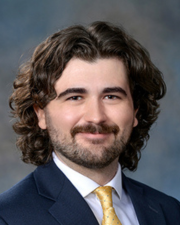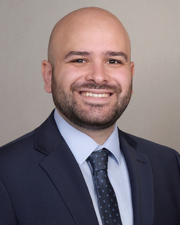Meet Our Residents
Namrata Walia, MD, MPH, MHA– PGY4

Namrata earned her MD from Yerevan State Medical University in Armenia, followed by MHA from UTRGV and MPH from UTHealth. Before joining residency training, she trained as a T-32 Postdoctoral Research Fellow with the Department of Family and Community Medicine at Baylor College of Medicine. Her clinical and research interests are focused on educating the underserved population on the devastating impact of the drug overdose crisis as well as available treatment options, including harm reduction practices, and reducing health disparities by promoting access to care.
Why I chose UTH Psychiatry Research Track: I chose the UTHealth Houston research track to engage in research opportunities that match my interest, eventually leading to a research-oriented academic career.
Ning Olivia Zhao, MD – PGY4

She received her Bachelor of Science in Biology and Bachelor of Arts in Global Health at Duke University and further pursued her Medical Degree at UTHealth Houston. Dr. Zhao aspires to become a leading clinician-scientist in consultation-liaison (C-L) psychiatry, focusing on the biopsychosocial mechanisms linking chronic illness and psychiatric outcomes. Her other research interests involve education research, specifically in curricula development and efficacy evaluation of educational initiatives. Dr. Zhao is the recipient of the Society of Biological Psychiatry Chair’s Choice Award, National Institute of Mental Health Outstanding Resident Award – Honorable Mention, APA SAMHSA Fellowship Award, ACLP Trainee Travel Award, and ACLP Developing Scholarship and Research Colloquium Award. Her ongoing devotion to research has resulted in seventeen peer-reviewed manuscript publications and thirty-six presentations in multiple disciplines at national and regional conferences, all of which contribute to her pursuit to become an academic C-L psychiatrist.
Why I chose UTH Research Track: I chose the UTHealth Houston research track because of the endless opportunities and exposure to a breadth of research avenues, offering me the flexibility to discover and further develop my research interests. The ability to combine my research aspirations with my clinical and civic engagement interests caught my attention, but it was the warm and supportive atmosphere of the faculty mentors that confirmed my decision.
Keiko Kunitoki, MD, MPH – PGY3

Keiko received her MD and PhD from the Tohoku University School of Medicine in Japan and holds a Master of Public Health from the Harvard T.H. Chan School of Public Health. Prior to joining UT, she completed a postdoctoral research fellowship and served as an instructor at Massachusetts General Hospital. Her research focuses on the mechanisms and treatment of negative symptoms in schizophrenia spectrum disorders.
Why I chose UTH Research Track: My interactions with several residents before joining confirmed a welcoming and collaborative atmosphere. Being one of the largest medical centers, I know the robust institutional support UTH offers. Furthermore, the unique backgrounds and interests of the residents and faculties greatly appealed to me.
Maykel Farag Ghabrash, MD, MS – PGY3

Dr. Ghabrash earned his medical degree from Cairo University Faculty of Medicine and completed a Master’s in Psychiatry at McGill University, focusing on affective disorders and related psychopharmacology. His work was recognized by Medscape-WebMD at the American Psychiatric Association (APA 2016) for its relevance to routine clinical practice. He then pursued a Post-Doctoral Research Fellowship in Addiction at the University of Montreal, focusing on the treatment of patients with co-occurring psychiatric and substance use disorders. His contributions have been acknowledged through the APA’s Research Colloquium Award for Junior Investigators (2018) and the Canadian Psychiatric Association’s Early Investigator Poster Award (2017).
During residency, he plans to study the interplay between fear, anxiety in psychosis, and the neurobiology of paranoid versus non-paranoid psychosis, utilizing fMRI to investigate aberrant corticolimbic processing.
Why I chose UTH Psychiatry Research Track: I relocated from Canada to the U.S. to begin my residency and pursue my research goal of advancing more precise interventions for psychiatric illnesses by deepening our understanding of the underlying neuropathological networks. The UTHealth Research Track offers exceptional breadth of expertise, fostering innovation and scientific progress. It also provides unmatched opportunities for collaboration. Most importantly, the faculty’s expertise, the cutting-edge techniques and methods, and the supportive environment make UTHealth a truly unique place for intellectual growth, productivity, and a strong sense of community.
Gustavo dos Santos Alves Maria, MD, PhD – PGY2

Dr. Maria received his medical degree from the Federal University of Minas Gerais, Brazil. He received his degree of Doctor of Philosophy from the Postgraduate Department in Molecular Medicine of the same university. His main research focus is neuromodulation for refractory mood disorders, and his interest in research is to deepen the knowledge in interventional psychiatry.
Why I chose UTH Psychiatry Research Track: I chose the University of Texas Health Science Center at Houston due to its strong bonds between clinical activities and research practices. Moreover, I felt that I would receive the support necessary to reconcile my clinical duties and my research curiosity, what confirmed to be true in the Research Track.
Ethan Faries, MD – PGY2

Dr. Faries received his medical degree from Baylor College of Medicine. During his time at Baylor, he conducted original research on substance use trends among patients with borderline personality disorder. In residency, he plans to continue to conduct clinical research on topics like personality and mood disorders.
Why I chose UTH Psychiatry Research Track: As a Houston native with a passion for scientific inquiry in psychiatry, the UTHealth research track made perfect sense for me. The breadth and depth of faculty expertise, cutting-edge techniques and methods, and inviting atmosphere make UTHealth a one-of-a-kind opportunity for intellectual growth, productivity, and camaraderie.
Joseph Kazan, MD – PGY2
 Joseph received his medical degree from the American University of Beirut. Before joining residency training, he completed a T32 post-doctoral research fellowship at the University of Pittsburgh Medical Center and was selected for the Burroughs-Wellcome Fund (BWF) Physician-Scientist Incubator Program. He collaborated on several projects with focus on late-life depression and neuroimaging biomarkers. He also helped lead the implementation of a NIMH-funded virtual intervention to prevent depression in recently bereaved older adults.
Joseph received his medical degree from the American University of Beirut. Before joining residency training, he completed a T32 post-doctoral research fellowship at the University of Pittsburgh Medical Center and was selected for the Burroughs-Wellcome Fund (BWF) Physician-Scientist Incubator Program. He collaborated on several projects with focus on late-life depression and neuroimaging biomarkers. He also helped lead the implementation of a NIMH-funded virtual intervention to prevent depression in recently bereaved older adults.
His other research interests include interventional modalities for treatment-resistant mood disorders.
Why I chose UTH Psychiatry Research Track: I believe UTH provides the perfect balance between nurturing support and rigorous discipline in training the next generation of physician-scientists. Located in the Texas Medical Center, the opportunities for collaboration are unparalleled, and the support of the program leadership validated my decision. The range of experiences in our program offers a valuable foundation for innovative thinking and scientific advancement.
Brian Yang-Chieh Chen, MD, PGY 1

Brian received his medical degree from China Medical University, Taiwan. Prior to starting psychiatry residency training, his research comprised of studying the efficacy of different interventional psychiatry modalities and exploring dose-response efficacies of novel psychiatric drugs. Current research interests include interventional psychiatry, artificial intelligence in psychiatry, and using electronic health records and registries to investigate trends in psychiatry.
Why I chose UTH Psychiatry Research Track: The UTH Psychiatry Research Track provides a rigorous clinical training environment alongside dedicated resources that support a broad spectrum of psychiatric research, making it an ideal setting for the development of physician-scientists. The depth and diversity of faculty expertise and resident backgrounds create opportunities to learn and approach psychiatry from multiple perspectives.
Himanshu Wagh, MD PGY1

Himanshu Wagh graduated with his MD from California Northstate University in California. During his free time, he conducted original research on topics he has personal experience with such as AI dating apps, concerning TikTok trends, video game addiction, and the development of machine learning models to classify pathological images. He is particularly interested in exploring how emerging technologies shape psychiatric symptoms, treatment delivery — and the evolving landscape of mental health.
Why I chose UTH Psychiatry Research Track: When I saw the impressive research posters and presentations by UTH residents at the APA conference, and how happy and close they were to each other, I knew I wanted to be part of that community. After joining the Research Track, I realized the benefits like close mentorship, additional educational days, protected research time, and, last but not least, increased research funding, were exactly what I needed to foster my academic development and contribute to the evolving landscape of mental health.
Christopher Kung, MD PGY1

Chris received his medical degree from UT Southwestern Medical School in Dallas, Texas. His research there focused on 1. Characterizing psychiatric disease burden and outcomes in the large, incarcerated patient population in Dallas; 2. Evaluating national disparities in health outcomes, such as race-based differences in maternal mortality during childbirth, as well as predatory billing strategies employed by major hospital systems in the United States. His research interests in residency include characterization of psychiatric disease burden in the Houston incarcerated population, economic analyses of healthcare spending in the public and private sectors in Houston, and investigation of novel interventional psychiatric techniques.
Why I chose UTH Psychiatry Research Track: I was impressed with the program’s extensive resources for pursuing our unique research interests, such as access to a wealth of datasets covering multiple domains of psychiatric care delivery, including the Houston jail system, active clinical trials for new psychiatric interventions, and ample full-time research blocks. Coupled with the robust clinical training in the heart of Houston, I felt confident UTH’s program would support me in becoming a complete physician-scientist.